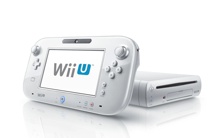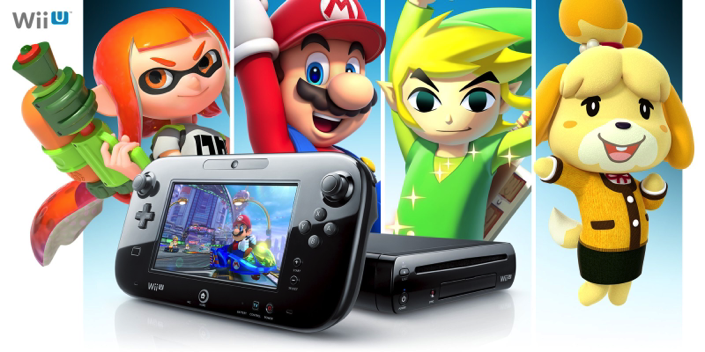 The Wii U was released as a handheld gaming device in 2012 and has since been replaced by the popular handheld Nintendo Switch in 2017. The Wii U was created in response to the popular Wii console, which Microsoft felt was only used “casually” by users and wanted a device that people could take with them on the go. However, the company experienced problems with user interface and functionality, not to mention a poor battery life. If you are after a handheld device, we would strongly suggest you opt for the ever-popular Nintendo Switch.
The Wii U was released as a handheld gaming device in 2012 and has since been replaced by the popular handheld Nintendo Switch in 2017. The Wii U was created in response to the popular Wii console, which Microsoft felt was only used “casually” by users and wanted a device that people could take with them on the go. However, the company experienced problems with user interface and functionality, not to mention a poor battery life. If you are after a handheld device, we would strongly suggest you opt for the ever-popular Nintendo Switch.
Latest Handheld Nintendo Console: Nintendo Switch
Shops With Wii U Offers
Wii U Buying Guide

The Nintendo Wii promised great things when it arrived in our lives in 2006. The idea was that it would compete with the PlayStation 3 and Xbox 360, but in truth it never had the same level of hardware to be able to make much of an impression in the market. Instead, the real difference for the Wii was the Wii Remote controller, which, alongside a Sensor Bar, could sense your position in a 3D space and allowed you to feel as though you were in control of a real character, moving them around and making their arms move and so on.
To give you some sense of what the Wii enabled you to do, you could use the controller to put yourself in charge of a tennis racket in a tennis game, for example, or to hold it like a golf club in Tiger Woods’s PGA Tour game. The real benefit being that if you did something wrong then your wife or girlfriend couldn’t take hold of the imaginary golf club and attack your car with it. But we digress…
The Wii was never going to make much of an impact in a market dominated by consoles that allowed for immersive and exciting gameplay, with top notch graphics and a real sense of next-generation gaming. But, it did offer something a bit different and was a good console for kids or younger people who might not appreciate the graphics of the PlayStation but could very much get in to controlling a character they can see on screen.
So, it was something of a surprise in November 2012 when Nintendo announced the release of the Wii U. It had seemed as though the Wii experiment was a good but, ultimately, doomed one. Not only did they decide to carry on with the model they’d established with the Wii, however, but some gaming commentators even think the Wii U is one of the best gaming consoles you can buy. Here we have a look at what the Wii U offers, why it’s different from other consoles and why you should consider looking at one if you’re in the market for a new gaming device.
The Hardware
The Wii U console is not entirely dissimilar from the original Wii as far as its dimensions and look is concerned. It is about 1.8 inches in height, 10.6 inches in depth and 6.75 inches in length and is a rectangular box with a somewhat sleek appearance. Output wise it offers the now standard HDMI port, which provides 1080p, 1080i and 720p outputs. It’s is slightly old school, though, in that it as an AV multiout for standard definition televisions.
There’s a port for the Wii motion sensor that we are used to from the original Wii, as well as 4 USB ports and an SD card slot. If you want to stand the Wii U vertically like you could with the Wii then you’ll need to buy a stand, or buy the Premium Package which comes with one. The Wii U is powered by an IBM multi-core processor and has an AMD Radeon based High Definition GPU. Storage wise it has 8 GB of internal flash memory with the basic model and 32 GB with the Deluxe model, but it does allow for external storage via USB.
Network wise it can get online via Wi-Fi and wired connections, and it has 4 USB slots that you can use to attach a Wii LAN adapter if you need to. It’s audio output uses a six channel PCM linear output through its HMDI connection, or an analogue output via the multi-out connection.
The thing that will interest any Wii owners is that fact that, unlike the PlayStation 4 and Xbox One, it has native backwards compatibility with nearly all the original Wii software and accessories. That includes up to 4 Wii remotes or Wii remote Plus’, the classic controller, Wii balance board and the famous Nunchuk.
The Wii U GamePad
Without question the main selling point of the Wii U is the Wii U GamePad. It could even be considered to be something of a game-changer, that’s how much Nintendo think the GamePad offers over traditional controllers.
The GamePad features all of the things you’d expect to find on a modern day controller, such as two analogue sticks, the traditional d-pad and the usual 4 buttons you find on any modern day controller. It also has the standard trigger buttons you’ll be used to if you’ve played with a controller from the PS4 or Xbox One, or their predecessors.
Touchscreen Display
The star of the show, though, is the 6.2 inch touchscreen display that sits in the middle of the controller and allows you to play games without your television, as long as the GamePad can connect to the Wii U console. The controller also has speakers, a microphone and a front facing camera.
The GamePad is a somewhat odd creation. It isn’t quite an out and out gaming controller but nor is it a tablet in the sense that we would all know of one. The screen is touch sensitive, but you can’t do things like pinch and zoom in the way that we might be used to doing with an iPad, for example.
Nintendo have gone all out to make the GamePad as useful as it can be in an entertainment sense, though, allowing you to calibrate it to become a universal remote control, should you want to. It is ergonomically pleasing, being well-sized with a contoured base that makes it comfortable to hold and, being only 500g it is quite light, meaning you can hold it for some time without getting tired.
The display is 854×480 pixels, so it is nice and clear, and Ubisoft claims that the delay between the controller and your television is around 1/60th of a second, which is as close to real time and you’re likely to get.
Built-In Motion Sensors
The GamePad features built in motion sensors, like an accelerometer and gyroscope, that allow you to control your character and even have a proper look around the gaming land that you’re playing in. According to its makers the geomagnetic sensors are about 15 times better than those found in a smartphone, so it really can pick up on your movements with minute detail.
The GamePad offer multi-functionality, but is less easy to immediately get your head around than the original Wii controller that you could merely look at and understand how it could act as a tennis racket or golf club. The screen can act as a second screen for things like maps or statistics about your gameplay. In a game like FIFA, for example, you could have your tactics on the GamePad’s screen and therefore be able to simply touch the tactic you wanted to swap to without having to drop into your settings.
Screen for Game Play
It can also be used as the screen on which you play the game, meaning that if your wife wants to catch up on Coronation Street or your husband is demanding to be allowed to watch the football then you can simply switch the gameplay onto the GamePad and carry on as if nothing has happened. This loses the second screen ability of the device, of course, but beggars can’t be choosers.
The GamePad really comes into its own during multi-player games, however. In Nintendo Land – one of the games Nintendo is keen to push the most – you can play lots of mini games, such as Luigi’s Ghost Mansion. In it the player with the GamePad controls a ghost, whilst the other players use a standard Wii controller and play different characters. The idea is that the ghost must walk up and touch all of the players before he gets found, and the players must work together to chase the ghost down. The trick comes in the fact that the ghost does not appear on TV and only appears on the GamePad. The Wii remotes vibrate when the ghost is near them, allowing the players to figure out when they are close to trapping the ghost because all 4 controllers will be vibrating at once.
During more traditional Nintendo games, such as Mario World 3D, you can use the GamePad’s touchscreen to stun enemies or collect gold coins, for example. Nintendo have even introduced a feature whereby you can control wind-activated things like platforms by blowing on the controller. It really is rather clever. The GamePad does have a built-in battery, but isn’t the best thing ever. It tends to last about 3 to 5 hours, so make sure you’re near to the charger if you’re in the middle of a game or it can just cut out when you’re least expecting it.
Entertainment
Nowadays no gaming console is complete unless it can act as an out and out entertainment system too, and the Wii U is no exception. It features a web browser – which is an experience that is normally quite frustrating on a console, but the touchscreen nature of the GamePad makes decidedly easier – as well as all of the normal HD streaming apps. Netflix, Amazon Instant Video and so on are all available and are all much easier to control and use thanks to the GamePad.
The other advantage, of course, is that you can give the GamePad to a young one if they want to watch cartoons whilst you keep the news on the main TV. The screen size means you’re hardly likely to toss your iPad out of the window – to say nothing of the fact that you need to be in contact with the Wii U console in order for the GamePad to work, so you can’t take it with you on the train or anything. That said, the GamePad is significantly bulkier and more substantial feeling than an iPad, so is the ideal thing if you’ve got a young family.
Offers Simple, But Immersive Games
The Wii U wasn’t intended to be a competitor to the Xbox One or the PlayStation 4. It doesn’t feature top of the range graphics or incredible hardware that will blow you away. But, as is so often the case with Nintendo’s gaming consoles, it is more about how you play the games than the games themselves.
Nintendo Land is the perfect game to sum up what the Wii U is all about it. You control a character that wanders around a world that has been made to look like a theme park, wandering past other characters that are being controlled elsewhere in the world by other real people (if you’re online. If you’re not then the other park “guests” will be computer generated). You can interact with the other characters and chat with them. Then, when you want to, you can go and play a mini-game within the world of Nintendo Land in much the same way that you would go on a ride at Disney.
Though you can play a lot of the games you’d find on the PS3 or Xbox 360, the Wii U is designed to target a more social game player than the other consoles. It’s a system that is built to get the best out of games like Mario Cart or Super Mario 3D World, so if you can’t stand looking at Mario then maybe the Wii U isn’t for you. But if you like a console that lets you play simple but immersive games, interact with other people, do something a little bit different from the other main consoles on the market and also become part of your home entertainment system, then it may well be the case that the Wii U is the console for you.
The GamePad is unlikely to have Microsoft or Sony shaking in their boots, but – much like the way the original Wii Remote resulted in the PlayStation Move controller and the Project Natal for the Xbox – it may yet cause them both to rethink the way they use the PlayStation Vita and Microsoft SmartGlass application. Nintendo aren’t at the forefront of the gaming market any more, but they can still innovate when they want to.

